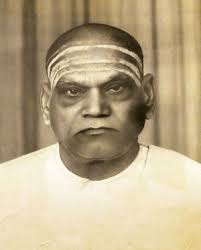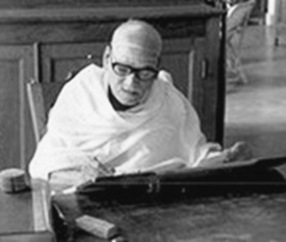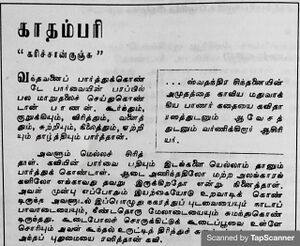Karichan Kunju
இந்தப் பக்கத்தை தமிழில் வாசிக்க: கரிச்சான் குஞ்சு
Karichaan Kunju (July 10, 1919 – January 17, 1992) was a Tamil writer, Translator trained in Indian philosophies. The novel 'Pasittha Maanudam' (starving humanity) written by him is said to be the first allegorical and transgressive text in Tamil. Hence, Karichaan Kunju is considered to be the pioneer of Tamil transgressive writing. Among many translations works, He has translated the eminent Marxist scholar Debiprasad Chattopadhyaya's 1976 book 'What is Living and What is Dead in Indian Philosophy' into Tamil as 'Indiya Thathuvangalil Nilaithanavum Azinthanavum' (what survived and perished in Indian Philosophy).
Birth, Education
R. Narayanasamy, popularly known as Karichaan Kunju, was born on July 10, 1919, to the couple Ramamrutha Shastri and Easwari Ammal in Sethanee puram (Chaitanyapuram), Nannilam Taluk, Thanjavur District. As his father passed away at a young age, Easwari Ammal worked as a cook at an inn in Kumbakonam. Karichaan Kunju helped her as a kitchen hand there. At the age of eight, his maternal uncle took him to Bangalore and enrolled him in a Veda paatasala which had free tuition. Karichaan Kunju studied Sanskrit and Vedas there. He came to Madurai at the age of fifteen and earned 'Vidwan' in Tamil and Sanskrit at the Devasthanam school (schools attached to Temples) while simultaneously working in different temple shrines. He Later attended Devasthanam School in Rameswaram. Till the age of 22, He was a student at such schools.
Personal Life
Karichaan Kunju worked as a Tamil teacher at Ramakrishna School in Chennai. He continued to work as a teacher in Kumbakonam Native High School, Vishnupuram High School, Mannargudi National High School. He often worked for a meagre salary, as he did not possess a statutory degree.
Karichaan Kunju married Sharada Amma. They have four daughters namely Lakshmi Baby, Prabha, Vijaya and Shantha. The Poverty in his youth, the unsupportive family, his schooling deprived of care, and the Vedantic philosophy he learned and studied, all combined to keep him firmly detached from the worldly life. But he was determined to get his daughters well educated, notes Writer Ravi Subramanian.
Literary Contribution
While working as a teacher in Kumbakonam, he became close to writers K.P. Rajagopalan, T. Janakiraman, M.V. Venkatram. Since Karichaan Kunju lost his father at a young age, he considered his ideal K.P. Rajagopalan, as his father. K.P. Rajagopalan used to write under the pseudonym Karichaan (drongo), the first bird that calls at dawn. Hence, he named himself 'Karichaan Kunju' (the juvenile drongo). He wrote in many magazines like Kalaamohini, KalaimagaL, Ajantha. He worked as an assistant editor in the magazine 'Thenee' (honeybee) run by M.V. Venkatram. His novella 'Sukhavaasigal' (hedonists) was later made into a Television serial called 'Manithargal' (people ). Karichaan Kunju's 1982 book 'Bharathi Thediyathum Kandathum' (what Bharati discovered and found) was about Mahakavi Bharathiyar's spiritual maturity is an important work in view of Vedanta. Karichaan Kunju's plays were collected and published as a compilation titled 'Kazhugu' (eagle).
Short Stories
In 1940, Karichaan Kunju's first short story 'Malarcchi' (bloom) under the pseudonym Ekaanthi, was published in Kalaimagal magazine. He continued to write stories in the magazine Sivaji published from Trichy by Triloka Sitaram. Karichaan Kunju had authored about two hundred stories, most of them remains uncompiled.
Novels
The first novel in modern Tamil literature that dealt with homosexuality is Karichaan Kunju's 'Pasittha Maanudam'. It is considered to be one of the first Transgressive novels of Tamil literature. "Underlying the novel is a theoretical position that transcends intellectually rejected egoistic atheism and pseudo-inert theism" says critic Venkat Swaminathan
Translations
Karichaan Kunju has translated many books from Sanskrit, Hindi and English into Tamil. Among his other linguistic contributions to Tamil is 'dhoni viLakku', a translation of Anandavardhana's treatise Dhvanyāloka, (A Light on Suggestion) from 9th CE Kashmir. His interest in Marxist philosophies led him to translate eminent Marxist Debiprasad Chattopadhyaya's 1976 book 'What is living and what is dead in Indian Philosophy' into Tamil as 'Indiya Thathuvangalil Nilaithanavum Azinthanavum' (what survived and perished in Indian Philosophy). His translation of Bengali Writer Sarath Chandra Chattopadhyaya's Naarir Mulya as 'Pennin perumai' (the Value of women) is noteworthy.
Articles
Karichaan Kunju's extensive collection of essays about his mentor K.P. Rajagopalan is his important contribution to Tamil literature.
Demise
At the age of 73, Karichaan Kunju died on 17th January,1992.
Biography
Karichaan Kunju Vazhkai Varalaaru - by Seshadri (Inthiya Ilakkiya Sirpigal Varisai, Sahitya Akademi publishing)
Literary Position
Literature explores the essence of man in two ways. One in reality in a normal level. and the other, in Idealist and extreme. The methodology of realism is to examine the value of man in his natural state. Judging by these two extremes is the methodology of the two aesthetics. Romanticism elevates human values to its zenith. Taking this to its opposite extremes, transgressive writing explores human virtues. Karichaan Kunju's 'Pasittha Maanudam' is of the latter. In Literary criticism, it is termed as transgressive fiction. Karichaan Kunju is considered to be the pioneer of Tamil transgressive writing.
Books
Short Story Collections
- ELiya Vaazkkai Muthaliya Kathaigal - Kaathal Kalpam (1955)
- Vamsarathinam (1964)
- Kubera Dharisanam (1964)
- Deiveegam (1964)
- Amma Itta Kattalai (1975)
- Andriravey (1983)
- Karichaan Kunju Kathaigal (1985)
- TheLivu (1989)
- Ethu Nirkum ? (2016)
- Karichaan Kunju Kathaigal - Full Collection (2021)
Novel
- Pasittha Maanudam
Short Novel
- SukhavaasigaL (1990)
Plays
- Kazhugu (1989)
- Kaalatthin Kural
Translations
- Inthiya Thathuvangalil Nilaithanavum Azhinthanavum - (of Debiprasad Chattopadhyaya - What is living and what is dead in Indian Philosophy)
- dhoni ViLakku - (of 9th CE Kashmiri Pundit Anandavardhana's Dhvanyāloka)
- Pennin Perumai - (of Sarath Chandra Chattopadhyaya's Bengali Essays 'Naarir Moolya')
- Shankara - (of T.M.P Mahadevan's Shankaracharya, 1968 National Book trust)
- Suriya Kaanthi Poovin Ninaivu - (of Assamese Writer Syed Abdul Malik's Shurujmukhir Shapna 1960)
Essay Collections
- Bharathi Thediyathum Kandathum (1982)
- Ku.Pa.Raa - Vaanathi Pathippagam (1990)
References
- Tamilonline - Thendral Tamil Magazine - Writer - Karichaan Kunju
- Karichaan Kunju - Thottram Tharum MuraNgaL - Venkat Saminathan
- Varumaiyilum Vazhvai Kondadiya Karichaan Kunju - Ravi Subramanian
- Ku.Pa.Raa Kalaiyin Thanithuvam - Karichaan Kunju
- Indhiya Thathuvangalil Nilaithanavum Azhinthanavum - Debiprasad Chattopadhyaya
- Shankarar - T.M.P. Mahadevan
- https://bharathipayilagam.blogspot.com/2011/11/blog-post.html
- "Viduthalaikku Munthaiya Tamil Sirukathaigal (1892 - 1947)": Thervum Thoguppum: Arvind Swaminathan - 2021 - Yaavarum Publishers
✅Finalised Page




